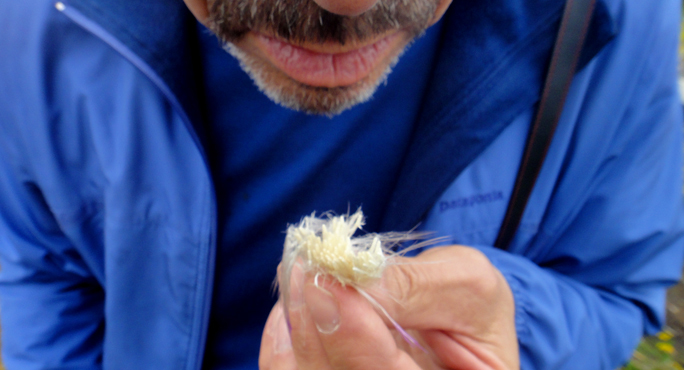Chris Kilham with Milk Thistle, Patagonia. Photo by Zoe Helene
Several years ago, only a few books on medicinal plants were available. “Back To Eden" by Jethro Kloss and “The Herb Book" by John Lust were popular guides, but there were none available on the science on medicinal plants. Enter 2011, consumers have an absolutely dazzling array of resources at their disposal from which they can draw information. The crown jewel of these is, of course, the Internet, which links vast information sources from all over the globe and makes it available at a click.
Today, more than 50,000 plants are used as medicines around the world. Thanks to superb databases, there is a lot of information available on what’s in medicinal plants and how they work in the body. At the same time, the hazards and marginal efficacy of many popular pharmaceutical drugs are also well-known.
While millions of people turn to both ibuprofen (Advil) and acetaminophen (Tylenol) for Pain relief, they can cause kidney and liver damage, respectively. Conversely, various studies on Curcumin, an agent found in common turmeric root, compares equally with both drugs, without toxicity. If bound to fats, curcumin also works almost as quickly. In other words, when shoppers complain about pain, they can avoid potentially toxic drugs and find relief in curcumin. In addition, curcumin also enhances liver health and improves brain function by improving the production of neuro-protective factors; Ibuprofen and acetaminophen won’t do that.
Approximately 70 percent of all the antidepressant drugs manufactured globally are consumed in the United States. Yet, the plant world offers an alternative treatment for most cases of mild to moderate depression in the form of the Siberian root Rhodiola rosea, one of the most extensively well-studied herbs of all time. Used worldwide by noted psychiatrists in place of potentially harmful drugs, Rhodiola brightens mood, improves energy, boosts libido, enhances immune function and supports cardiovascular health. Compared to far more expensive antidepressant drugs that often exacerbate depression, while producing gastrointestinal distress, sleep problems, anxiety, loss of sex drive and dependence, Rhodiola rosea is a bargain.
Cardiovascular disease (CVD), the single biggest killer of Americans, is often treated with statin drugs, whose complications include headache, nausea, vomiting, diarrhea, rashes, weakness and muscle pain. Yet, Cocoa, a good friend of chocolates, helps not only lower cholesterol, but lower the risk of CVD. A large body of readily available scientific research conducted on humans shows cocoa is an effective agent for reducing the risk of heart attack, stroke and high blood pressure. The Kuna of the San Blas islands off panama, for example, consume more cocoa than any population, and have freakishly low (almost non-existent) rates of these disorders. The message to your shoppers? Throw out the toxic statin drugs and eat healthy cocoa instead.
The liver, responsible for processing toxins, often suffers for its labors. Industrial and environmental toxins, aromatic hydrocarbons, unhealthy fats, alcohol and a host of poisons can weaken or damage the liver. However, Milk Thistle’s (Silybum marianum) seeds contain a group of compounds called silymarin. In cases of liver disease due to excessive alcohol consumption, milk thistle extract can repair a damaged liver if the alcohol use is suspended. In cases of mushroom poisoning, milk thistle can save your life and restore proper liver function. Milk thistle demonstrates anti-cancer activity, and is useful in some cases of viral hepatitis.
As retailers, it’s your job to educate your shoppers on the benefits of these herbs that offer healthier alternatives to their pharmaceuticals counterparts. Knowledge is power.
By Chris Kilham, for Natural Products Marketplace, January 2011


